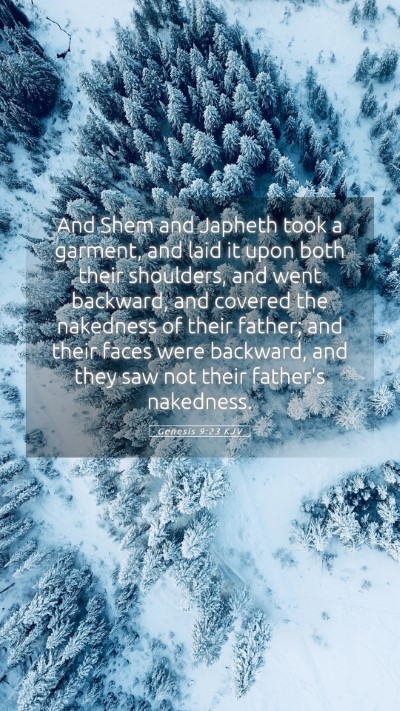Understanding Genesis 9:23 - A Comprehensive Commentary
Genesis 9:23 states: "And Shem and Japheth took a garment, and laid it upon both their shoulders, and went backward, and covered the nakedness of their father; and their faces were backward, and they saw not their father’s nakedness."
This verse is a pivotal moment in the narrative of Noah's family after the flood, encapsulating themes of respect, shame, and familial duty.
Verse Meaning and Insights
Interpretation of Genesis 9:23 reveals significant moral and ethical undertones, especially regarding the actions taken by Shem and Japheth as opposed to Ham.
-
Respect and Honor: Noah’s sons display an attitude of respect towards their father while covering his nakedness. This act can be viewed as a cultural norm, emphasizing the importance of family honor in biblical times.
-
Shame and Consequence: Ham’s actions, in contrast, represent shame and a lack of reverence. The repercussions of Ham’s disrespect not only affect him but extend to his lineage.
-
Symbolism of Garment: The garment itself symbolizes modesty and protection. Clothing in biblical texts often reflects one's dignity and honor.
-
The Act of Covering: By walking backward and avoiding seeing their father’s nakedness, Shem and Japheth teach the importance of not exposing others’ failures or weaknesses. This reflects on the broader theme of restoration and redemption.
-
Implications for Family Dynamics: The actions of Noah’s sons set a foundational example for familial relations, laying the groundwork for future interactions within families in biblical narrative.
Bible Verse Commentary
Insights from various commentaries elaborate further on this verse’s implications:
Matthew Henry: Henry emphasizes the moral lessons derived from this incident. He suggests that the act of Shem and Japheth illustrates the virtue of discretion and the avoidance of shame. Disrespect toward parents leads to dire consequences, a theme prevalent throughout scripture.
Albert Barnes: Barnes points out that the action of covering Noah also reflects the covenant relationship established between God and humanity following the flood. This act can thus be understood as a reinstatement of order and respect in family and community life.
Adam Clarke: Clarke offers insights into the cultural practices surrounding nakedness and shame in ancient societies. He suggests that Noah's laying uncovered is significant in the context of humility and human frailty after the overwhelming experience of the flood.
Historical Context
This chapter in Genesis occurs after the flood, a period of divine reset for humanity. The actions of Noah and his sons are not just personal but carry larger implications for their descendants. Understanding the historical context of pre- and post-flood ethics is crucial in forming a comprehensive interpretation of this passage.
Application of Genesis 9:23
Applying this scripture to contemporary life can prompt discussions about respect for elders, the treatment of family members, and the importance of discretion and kindness in our interactions.
-
In Family Dynamics: This verse encourages us to honor and protect our family’s dignity, promoting a culture of respect.
-
In Educational Settings: Discussions around integrity and vulnerability are vital for building character, paralleling the lessons drawn from Noah's sons.
-
In Community Life: Just as Shem and Japheth restored dignity to their father, communities are called to uplift and cover one another rather than expose flaws.
Related Bible Cross References
- Exodus 20:12: A reminder of the command to honor one’s parents.
- Leviticus 18:6-18: Laws regarding nakedness and family relations.
- 1 Peter 4:8: Encouragement to cover others' sins with love.


